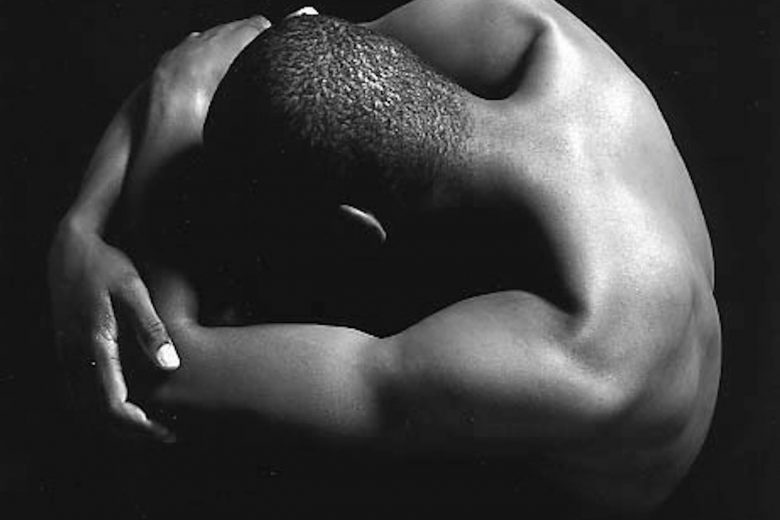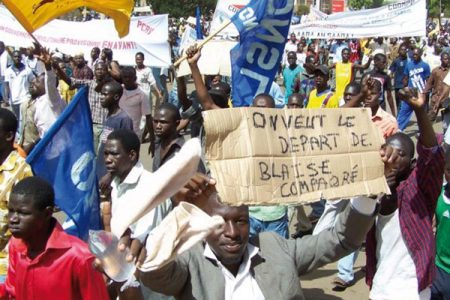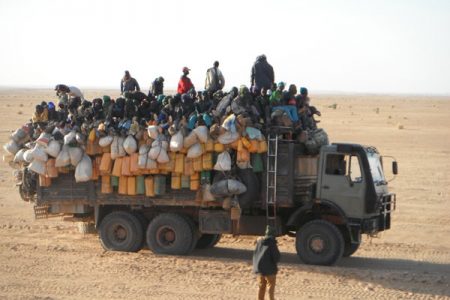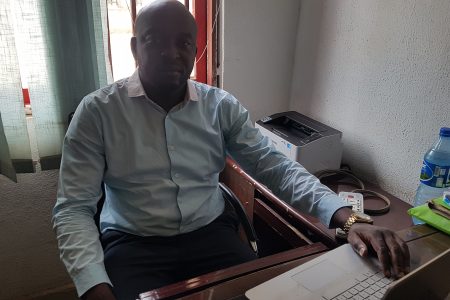The year 2017 ended with very disturbing news as reports of slave markets in Libya shocked the world, and many asked how such a thing could today even be possible. When such outrages become public, a search begins for the culprits. Is it the evil men of Libya selling the poor Africans, or evil elites in some African countries who keep their people in poverty, or are the culprits are the evil Europeans, desperate to keep the refugees out of Europe by all means? Or perhaps is it is the youth of Africa themselves that is not yet ready to change? Not yet ready to take responsibility for order and progress in their own countries but instead opted for the easy route and fleeing from the problems and difficulties at home? Or is it the Nigerians, Ghanaians, Guineans, Eritreans or others who sell their own sisters and brothers as commodities without a trace of guilt? Whatever their individual roles, all these actors, in my opinion, are complicit in the atrocities in Libya.
The acts of inhumanity we witnessed in countries around the world in 2017, be it the wars, the slave traders or the impoverishment of our own people by ruling elites, must bring us a cause for concern. How do each of us, individually and as a community, practice charity and altruism?
I hope that 2018 will be a year for the youth of Africa. Despite having the youngest population of any continent, Africa is ruled by the aged – with an average age of 75 years. No wonder there is little progress in some countries. Statistically, youth are in the majority, but what is preventing them wresting control of their future from the seniors? Would it not make more sense to organise themselves rather than to flee, in order to finally bring about long-awaited change in their homeland? The easiest solutions are not always the best. While everyone understands that changing society is a lengthy process, individuals must also be prepared to work together for the good of the nation.
In some African countries, there is a considerable resignation when facing their problems on their own. No other continent in the world has witnessed the emergence of so many “Free Churches” in a few years like Africa. The “pastors”, “bishops” and “prophets” of these Churches have become millionaires. The fact that many Africans no longer rely on their own strength and initiative to change their lives, but instead place their faith in the hands of these “representatives of God”, is simply sad. It is the capitalist nature of these free churches that strips the proverbial last shirt from the back of the poor.
It is a disgusting charlatanism when these Pastors look the faithful in the eyes, smile benevolently, and then rudely ask for donations “in the name of God”, indeed, with the assurance that the more money flows, the faster their earthly problems are solved, is disgusting charlatanism.
It is not surprising then, that some African governments do not care about what happens to their populations. Those who spend time praying and praying for hours each week have no time to worry about making real changes in their own country. This is one of Africa’s biggest dilemmas.
Trust in simple and fast solutions has not worked anywhere else in the world, so why do some Africans still believe in miracles from God? Is the Creator just a heavenly pizza delivery service, simply delivering their order?
Without a moral-ethical revolution, there will be no real change in these countries in the foreseeable future. Revolutions are not always won by weapons and war, many societies require only an intellectual revolution. Extracurricular education is just as important as classroom education. Many of the elites who have the control in many countries are highly educated academics. However, they do not use their knowledge and education for the benefit of their countries and their citizens.
This is why the youth of Africa must organise themselves. They have no choice but to take their fate into their own hands. Many do not even know what is waiting for them in the “paradise” of Europe: in Italy many Africans beg on the streets, in France many live as homeless people on the streets, while others work as prostitutes. Is this the longed for paradise – a despised existence in the dregs of European society?
So it’s high time for the youth to realise that, no matter what languages they speak, or what their ethnicity, they are all in the same boat – and not just in the Mediterranean …
Instead of making life difficult for each other, young people must finally learn to stand up for each other and to fight for a greater cause. Youth of Africa, wake up! Believe in yourself and take destiny into your own hands. One thing is clear: positive change may demand personal sacrifice, but there is no other road to happiness, more wealthier than this.
Which risk do you prefer? The risk of dying of thirst when crossing the Sahara, drowning in the Mediterranean, or ending up as a slave in Libya? Or the risk of organising and becoming active in your own countries – perhaps failing at first but still living on your own terms? Nonetheless, the right to travel or emigrate legally for education, work, business and leisure travel needs to be granted to everyone, not just citizens of Western countries.
The New Year begins with inspiration as s. Liberia peacefully elects as president a representative of the younger generation – ex-footballer and Senator George Weah. Perhaps there is hope after all.
[:de]Sind dies die bösen Männer Libyens, die die armen Afrikaner verkaufen, oder sind es die bösen Eliten in einigen Ländern Afrikas, die ihre Bevölkerung in Armut halten, oder sind es vielleicht die bösen Europäer, die die Flüchtlinge mit allen Mitteln von Europa fernhalten wollen? Oder ist es eventuell die Jugend Afrikas selbst, die noch nicht für Veränderungen bereit ist? Dazu, in ihrem eigenen Land für Ordnung und Fortschritt zu sorgen, anstatt den einfachen Weg zu nehmen, und vor den Problemen und Schwierigkeiten zuhause zu fliehen? Oder sind es einige der Nigerianer, Ghanaer, Guineer, Eritreer oder andere, die ihre eigenen Schwestern und Brüder als Ware verkaufen, ohne ein schlechtes Gewissen zu haben? Sei es wie es sei, alle diese Akteure sind meiner Meinung nach an den Gräueltaten in Libyen mitschuldig.
Die Unmenschlichkeit, die wir 2017 in vielen Ländern der Welt erlebt haben, seien es die Kriege, die Sklavenhändler oder die Verarmung des eigenen Volkes durch regierende Eliten, muss uns allen Grund zur Sorge geben. Wie hält es jeder von uns tatsächlich mit der Nächstenliebe?
2018 wird hoffentlich ein Jahr für die Jugend Afrikas werden. Afrika ist der Kontinent mit den jüngsten Bevölkerung, wird aber von Greisen mit einem Durchschnittsalter von 75 Jahren regiert. Kein Wunder, dass es in einigen Ländern kaum Fortschritte gibt. Statistisch gesehen ist die Jugend in der Mehrheit. Also, was hält sie davon ab, den Alten die Steuerung ihrer Zukunft aus den Händen zu nehmen? Wäre es nicht sinnvoller, sich zu organisieren anstatt zu flüchten, um eine im Grunde schon lange ersehnte Veränderung in ihrer Heimat voranzubringen? Die einfachen Lösungen sind am Ende nicht immer die Besten. Jeder weiß, dass eine Veränderung der Gesellschaft ein langwieriger Prozess ist, aber die Bevölkerung muss bereit sein, diesen Prozess zum Wohl der Nation gemeinsam anzugehen.
Die Resignation vieler Menschen in einigen afrikanischen Ländern davor, ihre eigenen Probleme selbst zu lösen, ist beachtlich. Auf keinem anderen Kontinent der Welt sind in wenigen Jahren so viele Freikirchen entstanden, deren „Pastoren“, „Bischöfe“ und „Propheten“ Einkommensmillionäre sind. Dass sich viele Afrikaner nicht mehr auf ihre eigene Kraft besinnen, um in Eigeninitiative ihre Lebensperspektive zu verändern, sondern diese Anstrengung in die Hand dieser „Vertreter Gottes“ verlagern, ist einfach nur traurig. Die kapitalistischen Züge dieser Freikirchen sind es, die den Armen das sprichwörtlich letzte Hemd ausziehen.
Den Gläubigen gütig lächelnd in die Augen zu schauen und sie dann knallhart „im Namen Gottes“ um Spenden zu bitten, ja, ihnen zu suggerieren, je mehr Geld fließt, desto schneller werden ihre irdischen Probleme gelöst, ist widerliche Scharlatanerie.
Dass es einige Regierungen ansonsten total egal ist, was mit ihren Bevölkerungen geschieht, ist nicht verwunderlich. Wer sich jede Woche stunden- und sogar tagelang mit Beten beschäftigt, hat keine Zeit, sich um echte Veränderungen im eigenen Lande zu kümmern. Das ist eines der größten Dilemmas Afrikas!
Das Vertrauen auf einfache und schnelle Lösungen hat nirgendwo auf der Welt funktioniert, warum also glauben einige Afrikaner trotzdem an durch Gott speziell auf sie persönlich zugeschnittene Wunder? Ist der Schöpfer etwa ein himmlischer Pizzaservice, der die Bestellung ausliefert?
Ohne eine moralisch-ethische Revolution wird es in absehbarer Zeit also keine echten Veränderungen in einige Ländern nicht geben. Revolutionen müssen nicht immer mit Waffen und Krieg gleichgesetzt werden, sondern ich meine, in vielen Gesellschaften muss es eine mentale Revolution geben. Außerschulische Bildung ist genauso wichtig wie die schulische Bildung. Viele der Eliten, die in vielen Ländern das Sagen haben, sind hochgebildete Akademiker. Aber sie nutzen dieses Wissen nicht zum Wohl ihrer Länder und ihrer Bürger.
Aus diesem Grunde muss sich die Jugend Afrikas organisieren. Es bleibt ihr keine andere Wahl, als ihr eigenes Schicksal in die eigenen Hände zu nehmen. Viele wissen überhaupt nicht, was im „Paradies“ Europa wirklich auf sie wartet: In Italien betteln viele Afrikaner auf der Straßen, in Frankreich leben viele als Obdachlose auf der Straße, einige Frauen verdienen Geld als Prostituierte. Ist das etwa das ersehnte Paradies – eine verachtete Existenz im Bodensatz der europäischen Gesellschaften?
Es ist also höchste Zeit, dass die Jugend merkt, dass, egal welche Sprachen sie spricht oder aus welcher Ethnie sie kommt, alle in einem Boot sitzen – nicht nur auf dem Mittelmeer…
Anstatt sich das Leben gegenseitig schwer zu machen, müssen die jungen Leute endlich lernen, gemeinsam füreinander einzustehen, um für eine größere Sache zu kämpfen. Jugend Afrikas, wache auf! Glaube an Dich und nimm Dein Schicksal in Deine eigenen Hände. Eines muss Dir klar sein: Auch positive Veränderungen sind mitunter mit vielen persönlichen Opfern verbunden, aber es gibt keinen anderen Weg zum Glück.
Welches Risiko wollt ihr lieber eingehen? Das Risiko, beim Durchqueren der Sahara zu verdursten, im Mittelmeer zu ertrinken oder vielleicht gar als Sklave in Libyen zu enden? Oder das Risiko, selbst aktiv zu werden und vielleicht zu scheitern, aber doch weiterzuleben? Ungeachtet dessen muss das Recht legal zu reisen oder auszuwandern für Bildungs-, Arbeits- und Geschäftszwecke sowie Urlaubsreisen Jedem zugestanden werden, nicht nur Bürgern der westlichen Ländern.
Das neue Jahr beginnt voller widersprüchlicher Ereignisse. Liberia hat friedlich einen Vertreter der jungen Generation zum Präsidenten gewählt, den Ex-Fußballer und Senator George Weah. Die Hoffnung stirbt zuletzt.



